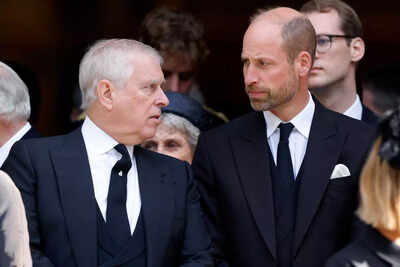ARTICLE AD BOX

Prince William royal reset for Prince Andrew / Image source: File
Prince William is reportedly preparing to take a much tougher approach to his uncle, Prince Andrew, than his father did, including using formal royal powers to remove Andrew from public life entirely and bar him from future royal events.
This move would mark a clear, public re-ordering of the family to protect the monarchy’s reputation.
What is Prince William’s plan to reset the Royal Family?
As heir and future king, Prince William appears determined to draw a sharp line with his uncle. Reports indicate he plans to use letters patent (a formal royal decree) to strip Andrew of remaining privileges and bar him from all future royal life, including private family gatherings and major state occasions like his eventual coronation.
In October 2025 Andrew relinquished his use of the “Duke of York” title, though legally he retains it unless Parliament acts, following discussions with the King.
Royal watchers believe William is frustrated with how Andrew continues to be a reputational risk and wants the monarchy rebranded: leaner, more accountable, less beholden to inherited privilege. This is not just about one man, but about the institution: the monarchy’s future in an era of heightened public scrutiny.
Why is this happening? Scandals, associations and reputational damage
The turning point is well-documented. Andrew’s friendship with Jeffrey Epstein (introduced by Ghislaine Maxwell in 1999) and the ensuing allegations of sexual misconduct by Virginia Giuffre damaged his standing deeply:
- In November 2019 Andrew gave a widely-criticised interview with the BBC’s Newsnight, declaring he was “too honourable” to end the association, which many described as a public relations disaster for the monarchy.
- He subsequently withdrew from public royal duties in May 2020.
- In August 2021 Giuffre filed a US civil lawsuit under the Child Victims Act against Andrew; it was settled in February 2022 out of court. Adding to this, Andrew’s title of Duke of York has a long historical record of misfortune — some commentators even call it “cursed”.
- By 2022, his honorary military titles and royal patronages were removed and he ceased using “His Royal Highness” in public
- In April 2025, he made his first public appearance after the death (by suicide) of his accuser Virginia Giuffre; the images underscored how much his public role has shrunk.
In short: from privilege to pariah.
Prince Andrew early years
Prince Andrew was born on 19 February 1960 at Buckingham Palace, the third child and second son of Queen Elizabeth II and Prince Philip. He held the position of second-in-line to the throne until the birth of his nephew, Prince William.
In 1979 he joined the Royal Navy, trained as a flight helicopter pilot, and served for many years - a distinguished start to his public life. In July 1986 he married Sarah Ferguson at Westminster Abbey and was made Duke of York, Earl of Inverness and Baron Killyleagh — titles loaded with heritage.
For a time he represented the monarchy abroad, undertook official engagements and had public visibility. But beneath the pageantry there were friction points: his commercial dealings, use of the “trade envoy” role, and cost to taxpayers fed media criticism.
Thus began a trajectory from royal promise to a complicated legacy.
What would it mean for the monarchy?
- Institutional implications: If William enacts these plans, the consequence is profound: Andrew will be excluded not only from public royal duties but from the private rituals of the royal family. He may lose rights to residences tied to his former role and be cut off from the royal support structure.
- Signal to the public: The move sends a message: the monarchy will no longer tolerate “guest appearances” by scandal-tainted royals. It reflects a shift from birthright to behavioural accountability. Such action is intended to rebuild public trust.
- Risks and watch-points: There are legal complexities (titles can’t simply be rescinded without Parliament) and risks of internal family rifts or public sympathy for Andrew. How the manoeuvre is carried out will matter.
Reports suggest Prince William intends to use the full legal toolkit available to a future monarch to cut formal ties with Prince Andrew — an attempt to protect the monarchy from recurring scandals and to set a firmer standard for public royal life. Whether William follows exactly as described, and how the public will react, remains to be seen; but the direction is unambiguous: reputation and institutional stability come first.

 10 hours ago
3
10 hours ago
3









 English (US) ·
English (US) ·